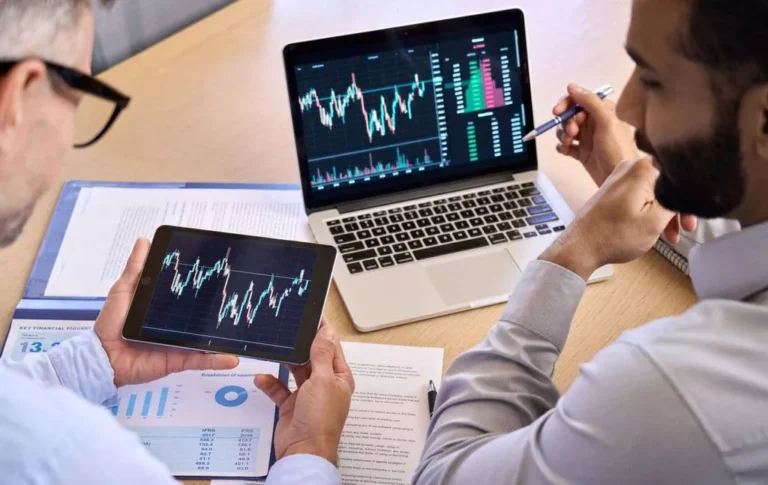Your broker then matches you up with another investor who wants to sell their shares of Apple stock. This process is called “order matching.”Once your order has been matched up with another investor’s order, the trade will be executed by the exchange where the trade takes place (more on this later). After the trade has been executed, you will become the owner of Apple stock and the other investor will no longer own it.

And with the availability of online trading platforms, many investors can initiate transactions with little or no contact with their personal broker. Although there are various types of brokers, they can be broken down into two categories. In the financial world, brokers are intermediaries who have the authorization and expertise to buy securities on an investor’s behalf. The investments that brokers offer include securities, stocks, mutual funds, exchange-traded funds (ETFs), and even real estate.
What is a broker?
Keep in mind that there is a physical delivery of the traded asset on the spot exchange, while in margin trading done with a broker, just the underlying asset is traded, not the physical one. Using crypto exchange vs broker cryptocurrency exchange is a traditional way to trade crypto and especially useful for lower amounts of money. These three firms account for roughly 65% of the world’s insurance brokering revenue.
- Some examples of the bigger market makers in the industry include BNP Paribas, Deutsche Bank, Morgan Stanley, and UBS.
- Once you have the trading basics down, you can start researching the exchange that is right for you.
- A broker is an individual or firm that charges a commission or fee to buy or sell securities on behalf of their clients.
- Binance, for instance, offers 120 cryptocurrencies for trading, which gives you a nice set of diversification options when selecting your trading strategy.
- Keep in mind that there is a physical delivery of the traded asset on the spot exchange, while in margin trading done with a broker, just the underlying asset is traded, not the physical one.
The clearinghouse handles the back office operations after the trade is placed, ensuring the trade is cleared. With an exchange, there are multiple buyers and sellers that are placing offers to buy and sell simultaneously. Buyers can choose to buy at any price, but the order will not be completed until a seller agrees to the transaction. The equilibrium price on these exchanges are set as the last agreed on price between buyers and sellers. Money is a key one, but passion and fascination with finance and the movements of investment funds are key, too. If you like dealing with people as well, you might prefer a broker’s life.
Cryptocurrency Broker vs Exchange: Which Should You Choose?
A cryptocurrency broker is also suitable if you want to buy a small number of cryptocurrencies, making it the more affordable option. Businesses raise capital by selling securities, while investors buy securities to make a profit. Investment bankers provide advisory services to businesses and help them raise the capital they need.
The broker provides additional tools for trading margins such as CFD trading (Contract for Difference), derivatives, etc. In some of them, the only thing a customer needs to provide is a valid email, which is then confirmed, then to set-up a password and that’s it. Some others, especially those who handle fiat money, need some kind of verification. It can be anything from a video-call, photo of the face holding ID, a scanned ID, or a complete KYC process, especially when a trader wants to use the higher limits of depositing and withdrawing his funds.
Market Maker
Instead, it matches corresponding traders together, allowing them to trade with each other. A broker’s client has a large number of ways to make a deposit, including credit cards, popular e-wallets, etc. This simplifies the whole process a lot, while, as a rule, there are no deposit fees whatsoever. An exchange allows users to trade directly with one another, whereas brokers act as an intermediary between buyers and sellers. There are both similarities and differences when comparing the source of income between a cryptocurrency exchange vs a broker. Both profits from the fees, but they have slightly different approaches to their clients.

In 2017, this industry exploded in popularity, and the crypto market began attracting the attention of more and more traders throughout the world. With extreme volatility and virtually unlimited profit potential, people started going absolutely crazy about it. As a result, a lot of tools, products, and services appeared in the market that opened the door to earning with cryptocurrencies. Brokers’ services are also suitable for those clients who are engaged in short and medium-term margin trading to benefit from fluctuations in the price of cryptocurrencies. Different exchanges offer various trading pairs, so it’s always an individual decision of the trader which one to choose. To give the reader an illustration, let’s imagine an investor, who deposits USD on an exchange.
SUCCESS RATE?! Debunk “Too Good To Be True” Chart Patterns with TradeDots
Brokers are usually used by speculative investors, who make various types of trades and who use different TA instruments and tools provided by brokers such as margin trading. They want to make short-term or mid-term profits and the broker is just a medium of how to reach those. For one, exchanges are regulated by the government, while brokers are not. This means that exchanges must follow certain rules and regulations in order to operate, while brokers do not have to adhere to these same standards. Debbie writes for many high-level and top-tier media organizations and has contributed to Barron’s, Chicago Tribune, The Guardian, MarketWatch, The Wall Street Journal, and U.S. Financial markets facilitate the trading of financial assets across many participants.
A clearinghouse is a designated intermediary between a buyer and seller in a financial market. The clearinghouse validates and finalizes the transaction, ensuring that both the buyer and the seller honor their contractual obligations. In other words, order execution quality is critical if you’re a short-term trader getting in or out of the market many times each day. But if you’re a long-term investor who holds positions for months or years, a penny or two on the way in or out is less important than choosing the right investments for your financial plan. Brokers play different roles depending on the types of services they offer. Brokers are a conduit to the markets, and they can use several types of trading venues to execute and fill a trade.
Fact-check: What Trump said about ‘$6 billion to Iran,’ immigration, economy at New Hampshire rally
Insurance brokerage is generally a highly regulated industry, with local and national laws covering how agents and brokers must conduct business. Clearinghouses are essential to the smooth functioning of the financial markets, They act as intermediaries, between the buyer and seller ensuring the smooth functioning of the markets. Stock exchanges such as the New York Stock Exchange (NYSE) have clearing divisions that ensure that a stock trader has enough money in an account to fund the trades being placed.

Higher liquidity usually means a smaller spread between buy and sell orders. Another difference is that exchanges usually have more options when it comes to payment methods, whereas brokers usually only accept wire transfers or credit/debit card payments. The clearinghouse enters the picture after a buyer and a seller execute a trade. Its role is to accomplish the steps that finalize, and therefore validate, the transaction.
Security
Sometimes a market maker is also a broker, which can create an incentive for a broker to recommend securities for which the firm also makes a market. Investors should thus perform due diligence to make sure that there is a clear separation between a broker and a market maker. Although brokers may route certain orders to certain venues for additional revenue, the SEC also requires them to disclose the quality of their trade execution. Brokers must report how orders are filled and at what prices compared to the publicly available bid and ask spread at the time. The SEC also mandates that brokers must disclose if their orders are not routed for the best execution. Regulators require that brokers seek the best deals for their clients, which is why brokers will evaluate the best venue to execute a trade.
What is an exchange
Additionally, many people are uncomfortable leaving assets on an exchange due to the risk of them being lost or stolen. Traders on exchanges are more at risk of slippage because they lack the price guarantee that a brokerage offers. Normally this isn’t an issue, but for less liquid assets or large transactions, it is possible that an exchange could lack sufficient liquidity to fill an order. On an exchange, the price of an asset is determined by the actors who are trading it. An exchange makes money by charging a fee to the traders once they are matched and the order executes.
The clearing division acts as the middle man, helping facilitate the smooth transfer of the stock shares and the money. In this example, the clearinghouse has ensured that there is sufficient money in the account to cover any losses that the account holder may suffer in the trade. Once the trade is closed, the remaining margin funds are released https://www.xcritical.com/ to the trader. The initial margin can be viewed as a good faith assurance that the trader can afford to hold the trade until it is closed. These funds are held by the clearing firm but within the trader’s account, and can’t be used for other trades. The intention is to offset any losses the trader may experience in the transaction.
